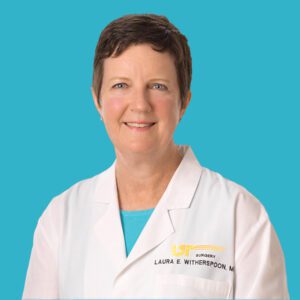Q. My mom is battling dementia, and I think it’s time to consider assisted living. What is the best way to broach the subject with her?
A. This is never an easy thing to do, especially if your loved one is in the early stages of the disease. They can still understand what “assisted living” means and the alleged stigma that accompanies the term.
Some tips to help with this conversation:
- Be transparent and voice your concern to them. They need to know that your motives come from a good place. Our parents can tell if we are trying to deceive them.
- Let them be involved in the choosing process, if they are able. The hardest thing for a loved one battling dementia is the loss of independence. Make them feel as involved in the process as they can be, and even encourage them to have lunch at the community to get a feel for it.
- Be a good listener and listen to their concerns while being sympathetic to their worries.

Alisha Landes
Executive Director, The Lantern at Morning Pointe
- 423.551.4190
- 7620 Shallowford Road, Chattanooga, TN 37421, USA
- morningpointe.com
Q. I recently tore my ACL and am having surgery to repair it soon. Will I ever be able to return to competitive sports?
A. ACL tears are one of the most common knee injuries in athletes who participate in high-demand sports that involve sudden stops, jumping, or rapid changes in direction. Due to the resulting instability of the ACL-deficient knee, an athlete involved in agility sports will most likely require surgery to safely return to sports.
The large majority of ACL tears cannot be simply sutured back together, but instead, typically require a full reconstruction. Surgeons will generally use a graft as a scaffolding for your new ligament to grow onto during the rehabilitation process. In the post-operative period, an accelerated physical therapy program is started immediately to help patients regain motion and strength. The final phase of rehabilitation is individualized to specifically prepare each athlete for the demands of their chosen sport. Although the overall recovery can take 9-12 months and involves a lot of hard work for the motivated patient, the majority of athletes are able to return to the same level of competition as they were prior to injury.

Chad Smalley, MD
Arthroscopic Knee and Shoulder Specialist, Center for Sports Medicine & Orthopaedics
Q. What are my treatment options for spider veins?
A. Spider veins are small clusters of veins that appear on the ankles, calves, and thighs. They may be caused by prolonged standing, pregnancy, hormonal shifts, weight changes, or hereditary factors. Sclerotherapy is the most common form of treatment for spider veins. During the procedure, a chemical agent, such as concentrated saline, is injected into the vein at several different points. The agent causes irritation in the lining of the veins. Along with bandage compression after treatment, this causes them to collapse with time, resulting in fading and smoothing of the area. The treatment is performed in an outpatient setting and does not require surgery or anesthesia. Usually two to four treatments spaced six weeks apart are required to obtain optimal results. Some risks of spider vein treatment include swelling, bruising, skin darkening, and ulceration. Sclerotherapy may not remove very large spider veins completely, but will soften the appearance.

Cindy McCord, MD
Plastic Surgeon, Associates in Plastic Surgery
- 423.624.0021
- 3404 Navajo Drive Chattanooga, TN 37411
- captivatingbeauty.com
Q. My daughter’s relationship with food has changed significantly recently. Should I be worried?
A. Many people begin dieting or may lose weight due to illness or sports activities. Because of multiple factors, this may trigger disordered eating. What to look for:
- Personality changes (becoming easily irritated or depressed)
- Weight loss or gain (may or may not be present)
- Withdrawal from others
- Preoccupation with or avoidance of food (preparing but not eating)
- Excessive exercise
- Excessive trips to the bathroom after meals
- Smell of vomit on person (vomit in and around toilet)
- Dressing in layers to hide weight changes or to stay warm
- Eating large quantities of
food rapidly - Hiding food
- Poor dental health and stomach complaints (e.g., acid reflux)
- Spending money rapidly
- Excessive food packaging in garbage, car, or bedroom
- Distorted view of body shape or size, concerned about being “fat”
If you are worried, compassionately point out your concerns to your loved one. If she is defensive, consult a specialist to guide you. Remember that her unwillingness to acknowledge the problem is part of the problem. Do not give up or back off because of her reluctance. This is a brain-based illness with psychological, social, and physical consequences.

Siri Khalsa-Zemel, PhD, RDN, LDN
Director, Focus Treatment Centers
- 423.308.2560
- 7429 Shallowford Rd Chattanooga, TN 37421
- 2210 Sutherland Ave, Ste 115 Knoxville, TN 37919
- focustreatmentcenters.com
Q. I just scheduled my first mammogram. What should I expect?
A. The mammogram technologist will have you undress from the waist up and put on a gown. She will take you into the mammogram suite and take two digital mammograms of each breast. Mammograms require compression of the breast in order to best visualize all the breast tissue, so this may be briefly uncomfortable.
If anything about the procedure becomes painful, let the technologist know. The technologist will check the images to be sure they are adequate, and will then let you get dressed. You will receive a letter in the mail from the imaging center with your results. When there is a question about something on the mammogram, which happens 5-10% of the time, additional mammograms or an ultrasound will be required. If this is the case, you will be called by the center to return for this additional imaging. If there is still an area of concern after additional images, the radiologist will discuss these results with you.

Laura E. Witherspoon, MD, FACS
Surgeon, University Surgical Associates Breast Services
- 423.267.0466
- 979 E 3rd St Ste C300 Chattanooga, TN 37403
- universitysurgical.com

